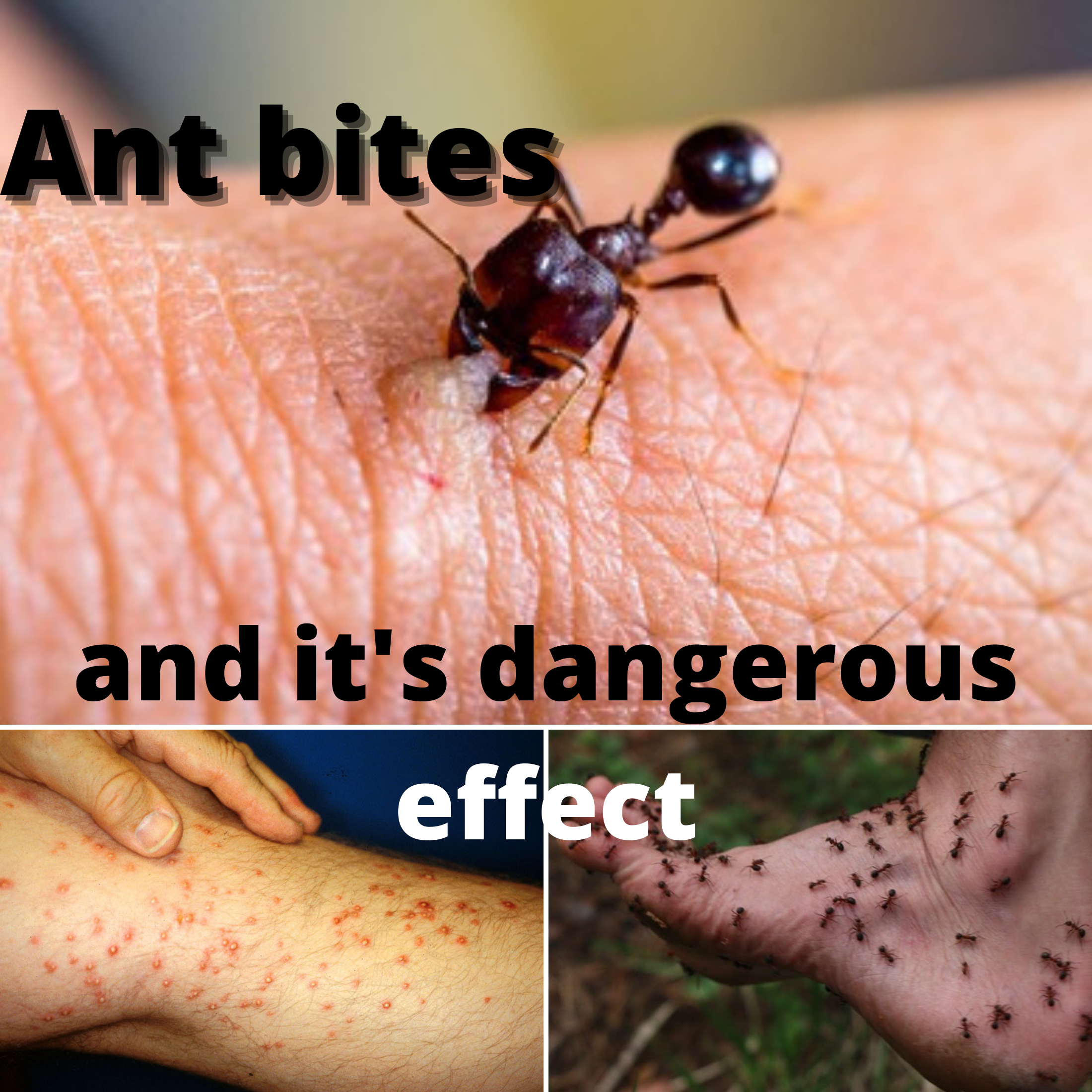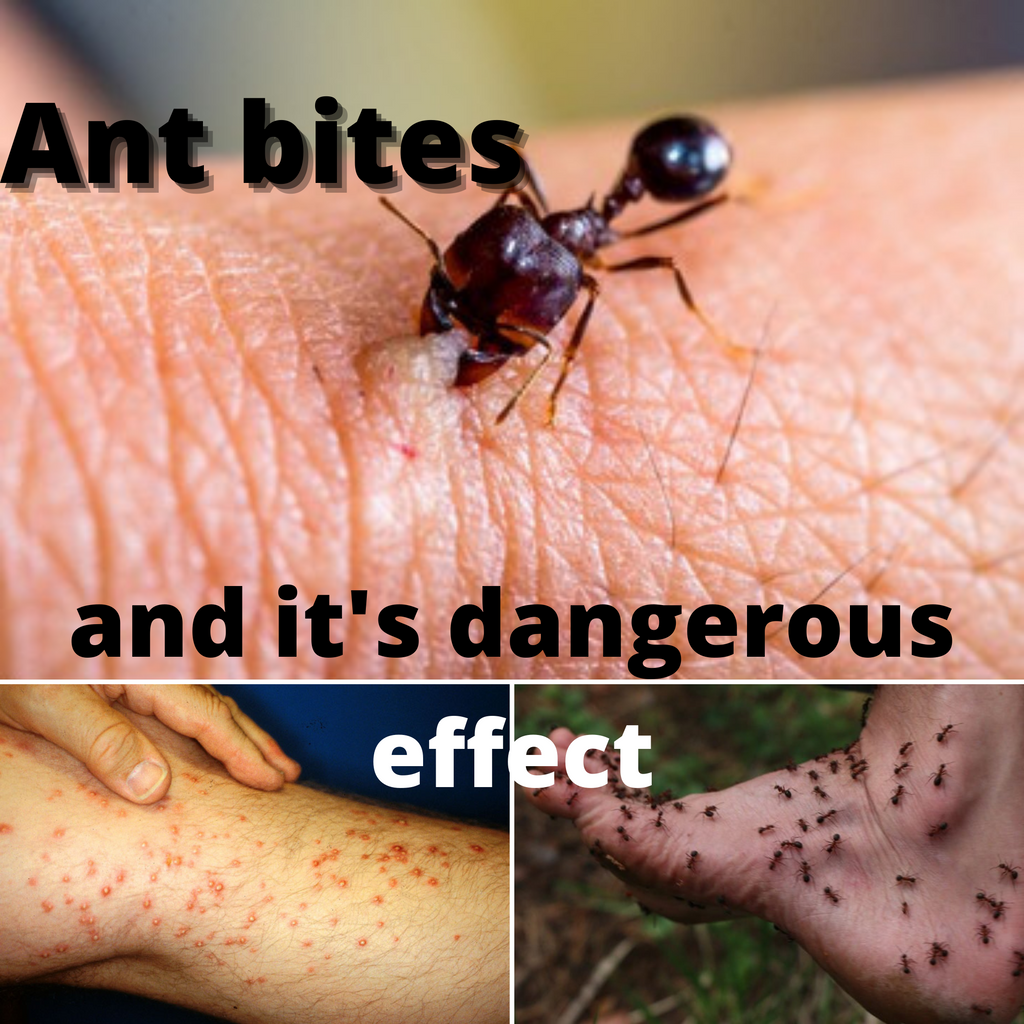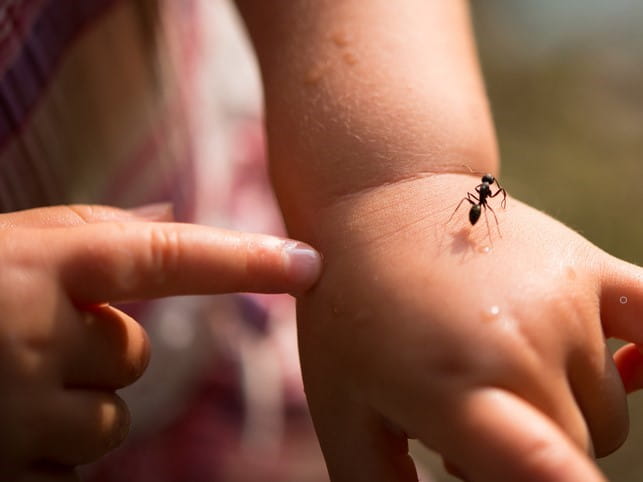Ant bites can be dangerous, causing redness, pain, and swelling. In some cases, people may also experience allergic reactions, leading to severe symptoms that require medical attention.
While most ant bites are not life-threatening, it’s important to be aware of the potential risks, especially for those with allergies or compromised immune systems. Understanding the signs of an allergic reaction and knowing how to treat ant bites can help prevent serious complications.
This article will explore the dangers of ant bites, common symptoms, and appropriate first aid measures for addressing them. By the end, you’ll have a clear understanding of the potential risks associated with ant bites and how to best protect yourself and others from their harmful effects.

Credit: paidepo.com
Types Of Ants
Ant bites can be dangerous as certain types of ants like fire ants and bullet ants deliver painful bites that can cause allergic reactions, infections, or in rare cases, anaphylactic shock. It is important to seek medical attention if you experience severe symptoms after being bitten by ants.
Ants are tiny creatures that can be found almost everywhere, from your backyard to the deepest corners of the forest. While many ants pose no harm to humans, there are a few types that can deliver painful bites. Understanding the different types of ants is essential to identify potential risks and take appropriate precautionary measures.Fire Ants
Fire ants are notorious for their aggressive behavior and painful stings. These small reddish-brown ants are commonly found in warmer regions, such as the southern parts of the United States. When disturbed, fire ants can attack in groups, leaving their victims with burning, itchy welts. Their bites can cause severe allergic reactions in some people, leading to breathing difficulties and even anaphylactic shock in rare cases.Bullet Ants
Considered one of the most venomous ants in the world, bullet ants inhabit the rainforests of Central and South America. These large black ants have an intimidating name derived from the intense pain caused by their bites, which is often compared to being shot. The venom from bullet ant bites can result in excruciating agony that can last up to 24 hours. It is crucial to avoid any encounters with these ants as their stings have been described as one of the most painful experiences known to mankind.Carpenter Ants
Unlike the aggressive nature of fire ants and bullet ants, carpenter ants are known for their destructive behavior. These ants create nests inside wood, including the structure of your home, causing potential structural damage. Carpenter ants have powerful jaws that allow them to chew through wood easily. While their bites are not as painful as those of fire ants or bullet ants, the real concern lies in the damage they can cause to your property.In conclusion, understanding the different types of ants is crucial to protect yourself and your property from potential harm. Fire ants, with their painful stings and potential for allergic reactions, should be avoided at all costs. Bullet ants, known for their excruciating bites, are best left undisturbed in the rainforests they inhabit. Finally, be cautious of carpenter ants and their ability to cause structural damage. By staying informed about these types of ants, you can enjoy a safer and more comfortable environment.
Credit: paidepo.com
Symptoms Of Ant Bites
Symptoms of Ant Bites: Ant bites can cause a range of unpleasant symptoms, which may vary depending on the type of ant and an individual’s sensitivity. It’s important to recognize these symptoms to seek appropriate treatment.
Pain And Swelling
Ant bites often lead to localized pain and swelling. The affected area may become tender to the touch and exhibit redness. The level of discomfort can range from mild irritation to intense pain.
Itching And Redness
Ant bites commonly result in itching and redness around the bite site, which can cause significant discomfort and irritation. Scratching the area may exacerbate these effects and increase the risk of infection.
Treatment Options
Ant bites can be painful, and some people may have an allergic reaction. Treatment options include washing the area with soap and water, applying a cold compress, and using over-the-counter antihistamines or corticosteroid creams to reduce inflammation and itching. It’s important to seek medical attention if symptoms worsen.
Treatment OptionsWhen it comes to treating ant bites, it’s crucial to know the various options available for relieving discomfort and preventing any potential complications. Both home remedies and medical interventions play a vital role in managing ant bites.Home RemediesFor minor ant bites, there are several effective home remedies that can help alleviate pain and reduce swelling. These can include:– Applying a cold compress to the affected area to reduce inflammation and numb the pain. – Using a paste made of baking soda and water can help neutralize the acidity of the ant bite and relieve itching. – Aloe vera gel, known for its soothing properties, can provide relief from itching and inflammation.Medical InterventionsIn more severe cases where ant bites lead to allergic reactions or infections, seeking medical interventions becomes necessary. Medical treatments for ant bites can involve:– Antihistamines and corticosteroid creams to manage allergic reactions. – Antibiotics to treat any secondary infections that may arise from scratching the bites.Ultimately, whether opting for home remedies or seeking medical attention, promptly addressing ant bites is essential in preventing any potential complications.Potential Risks
Ant bites may seem like minor nuisances, but they can pose certain risks to our health. It’s important to be aware of these potential risks to ensure our well-being and seek appropriate medical attention if necessary. In this section, we will explore two primary risks associated with ant bites: allergic reactions and secondary infections.
Allergic Reactions
While most people experience mild reactions to ant bites, such as localized pain, redness, and itching, some individuals may develop allergic reactions that can be more severe. Allergic reactions occur when the immune system overreacts to the venom injected by ants during a bite.
Typically, allergic reactions to ant bites manifest as:
| Symptoms | |
|---|---|
| Swelling at the bite site | Skin rash or hives |
| Difficulty breathing | Dizziness or lightheadedness |
| Nausea or vomiting | Wheezing or coughing |
| Swollen tongue or throat |
If you or someone around you experiences any of these symptoms after an ant bite, it is important to seek immediate medical attention. Severe allergic reactions, known as anaphylaxis, can be life-threatening if not treated promptly.
Secondary Infections
In some cases, ant bites can lead to secondary infections if the skin is broken or the bites are vigorously scratched. When the protective barrier of the skin is compromised, bacteria can enter the wound, leading to infection.
Common signs of a secondary infection caused by ant bites include:
- Pus or discharge from the bite
- Increasing pain, redness, or swelling
- Warmth or tenderness around the bite area
- Fever or chills
To prevent secondary infections, it is crucial to avoid scratching the ant bites and keep the affected area clean and dry. If you suspect a secondary infection, consult a healthcare professional for proper diagnosis and treatment.
Prevention Tips
Ant bites can be dangerous for some people, causing pain, swelling, and potential allergic reactions. To prevent ant bites, avoid leaving food and crumbs around, seal off entry points, and keep outdoor areas clean and tidy. Use insect repellent and protective clothing when spending time outdoors to minimize the risk of ant bites.
Avoiding Ant Nests
stay away from ant nests. These nests can be found near damp areas or in piles of wood and debris. Do not disturb or step on them.Protective Clothing
protective clothing like closed shoes and long pants can help in avoiding ant bites. Seal any openings or gaps in your clothing to prevent ants from crawling in.Using insect repellent on exposed skin can also discourage ants from approaching you.
Credit: www.fireants.org.au
When To Seek Medical Help
Ant bites are usually mild, but in some cases, they can cause severe reactions or persistent symptoms, requiring medical attention.
Severe Reactions
If you experience symptoms such as difficulty breathing, chest pain, dizziness, or swelling of the face and tongue, seek immediate medical help.
Persistent Symptoms
If you have persistent symptoms like intense pain, redness, or swelling at the bite site, or symptoms that last for more than a few days, consult a healthcare professional.
Frequently Asked Questions On Are Ant Bites Dangerous
Are Ant Bites Dangerous To Humans?
Ant bites can cause discomfort, itching, and swelling. In most cases, they are not dangerous and can be treated at home with simple remedies.
How To Identify If An Ant Bite Is Problematic?
Signs of a problematic ant bite include severe pain, redness, swelling, and pus. Consult a healthcare provider if you experience these symptoms.
Can Ant Bites Lead To Allergic Reactions?
In some individuals, ant bites can trigger allergic reactions such as hives, difficulty breathing, and swelling of the face. Seek immediate medical attention if allergic reactions occur.
Conclusion
Though ant bites are generally not dangerous, they can still cause discomfort and irritation for individuals who are allergic or have a sensitive reaction. It is important to take necessary precautions to avoid ant bites, such as wearing protective clothing and using insect repellent.
If you experience severe symptoms or an allergic reaction, seek medical attention immediately. Stay safe and be cautious when dealing with ants to prevent any potential harm.

I’m MD Tanvir, and I bring years of expertise gained from working closely with pest control companies to the forefront. My journey in the industry has inspired me to launch Bug Battler, a platform aimed at equipping people with the know-how to combat pests autonomously. Through Bug Battler, I aim to empower individuals with practical insights to tackle pest infestations effectively.

